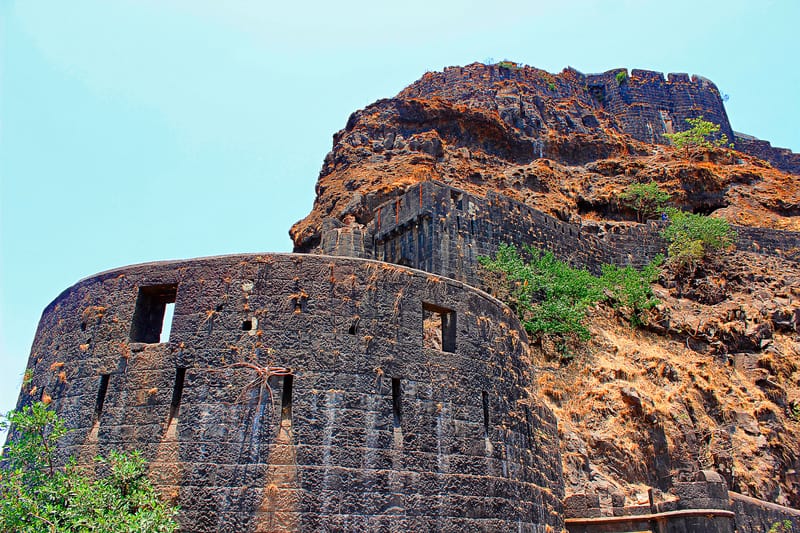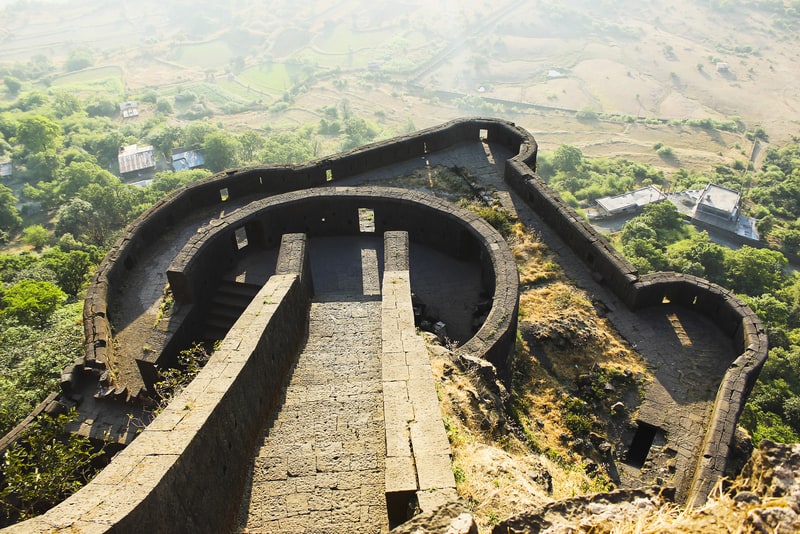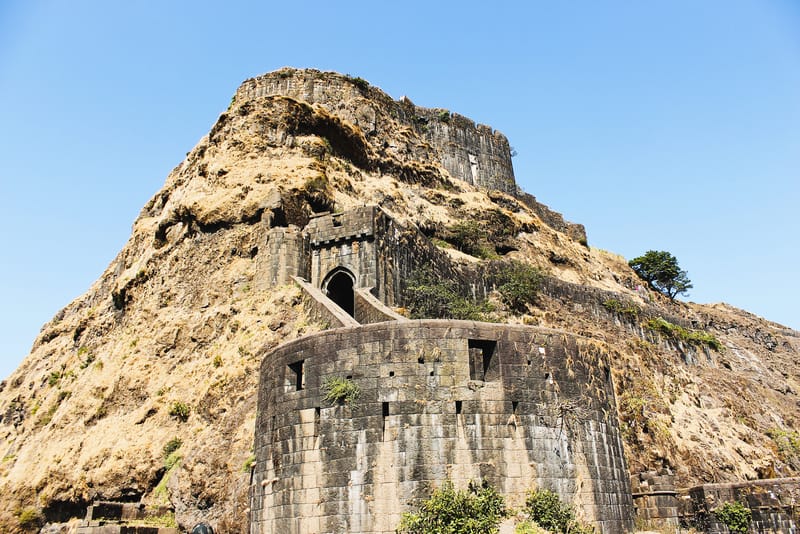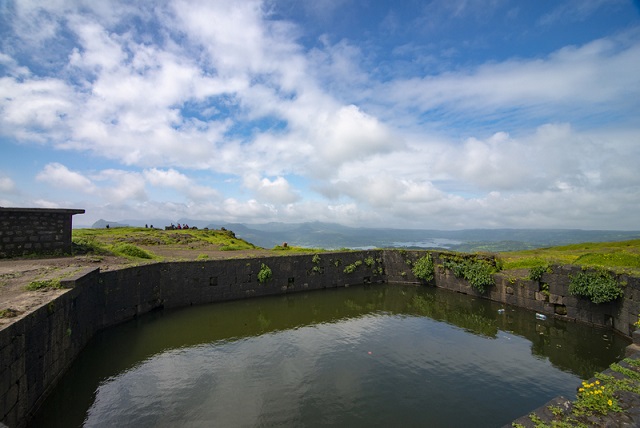
| Fact | Details |
|---|---|
| Location | Lonavala, Maharashtra, India |
| Elevation | 1033 meters above sea level |
| Builder | Originally built by Chhatrapati Shivaji Maharaj |
| History | Captured by the Mughals in 1665, recaptured by the Marathas in 1756 |
| Notable features | Large gate, a small temple, water tanks, Bhaja and Karla Caves |
| Popular activities | Hiking, sightseeing, exploring the history |
| Best time to visit | During the monsoon season (June to September) for lush greenery |
| Accessibility | Accessible by road and a moderate trek of about 1 hour from base |
| Nearby attractions | Bhaja and Karla Caves, Visapur Fort, Tikona Fort, Tung Fort |
- Lohagad Fort is one of the numerous hill forts in Maharashtra, India. Interestingly, this fort rises to an elevation of about 3,388 feet high and is located near the hill of Lonavala and Pune to the northwest.
- For most of the time, this fort was under the Maratha Empire and the Mughal Empire for a few years.
- The fort was initially built in the 16th century by the Maratha ruler, Chhatrapati Shivaji Maharaj, and was later captured by the Mughals in 1665. It was finally captured by the Marathas in 1756 and was used as a strategic fortification during the Peshwa rule in the 18th century.
- The fort has several prominent features, including a large gate, a small temple dedicated to Lord Shiva, and several water tanks. One of the main attractions of the fort is its well-preserved Bhaja and Karla Caves, located at the base of the fort.
- Today, the fort is a popular destination for hikers and history enthusiasts, who can enjoy scenic views and explore the various structures and artifacts from its rich past.
History
Lohagad, or the iron fort, has had a long history, with many dynasties having their period of occupation. Some dynasties who occupied this fort included Chalukyas, Marathas, Nizams, Mughals, and many more.
Amazingly, this fort has had many uses unique to rulers who occupied it, like keeping a treasury and even living.
Importance of the fort
This fort has immense historical significance, is an abode of archaeological beauty, and has been used by various rulers for various duties. Another importance of the past century is that the fort was among the many forts Chhatrapati Shivaji had to hand over because of the Purandar Treaty.
However, as the ruler went on a mission to recapture the forts, Lohagad came under his bastion, becoming part of his significant achievements.

Battles were fought at the fort.
Chhatrapati Shivaji was the founder of the Maratha Empire, which is legendary in the history of India. Some battles were fought, resulting in handing over or recapturing the fort. Here are some of the battles fought;
• Battle of Mysore plateau
• Battle of Sinhagad
• Battle of Surat
• Battle of Poona
Tourist attraction
Lohagad Fort is situated at the topmost of a hill, and getting it is advantageous in seeing structures like temples and lakes. Visiting during the monsoon will let one see both small and massive waterfalls.
However, during this monsoon season, extra care is needed because of the slipperiness of the moss. While at the top of the fort, one will get a clear view of the valley. Also, it is easy to get a good look at neighboring dams. Moreover, it is possible to see Bhaja and Karla caves at the top.
How to reach
Lohagad Fort is located in the Western Ghats, near the famous hill station of Lonavala in Maharashtra, India. Here are some ways to reach Lohagad Fort:
- By road: Lonavala is well-connected to major cities in Maharashtra and the neighboring states. From Lonavala, Lohagad Fort is located about 12 kilometers away. One can take a taxi or drive to the base village of Lohagadwadi and then hike up to the fort.
- By train: Lonavala is a major railway station on the Mumbai-Pune route and is well-connected to major cities in India. One can take a local bus or taxi from Lonavala to Lohagadwadi village and then trek to the fort.
- By air: The nearest airport to Lonavala is the Pune International Airport, located about 64 kilometers away. One can take a taxi or hire a car from the airport to reach Lonavala and then proceed to Lohagad Fort.
Once you reach Lohagadwadi village, you can begin trekking to the fort. The trek takes about an hour and covers a distance of approximately 4 kilometers. The trek is of moderate difficulty and is suitable for all age groups. However, wearing comfortable shoes and carrying water and some snacks for the hike is recommended.
Mumbai and Pune are near the fort since they are approximately 90 and 55 kilometers away.

Timing and entry fee
For any plan to visit the fort, one must visit during the day, given that it is easier to see now. For entry fees, foreign tourists are expected to pay Rs. 400, and locals pay Rs 50. However, guided tours require pre-booking for easy allocation of guides.
Trekking to the fort
The trek to Lohagad Fort is visually delightful. Visiting on a perfect day, a cool breeze will follow you, and the lush greenery in the surroundings will invite newcomers to stay longer than expected.
Steps to the fort are amazingly spacious and often become steep as one approaches the peak of the fort. Trek from the base to the peak and check the fort’s gates for their architecture.
In short, Lohagad Fort is a fantastic tourist and archeological site with major historical importance. Historians around the globe and people who love to hike often have an excellent time visiting this fort. The Lohagad Fort experience is fascinating and worth trying, especially for hike lovers.

Apart from Lohagad Fort, several other popular attractions exist in and around Lonavala. Some of them are:
- Bhaja Caves: Located about 12 kilometers from Lohagad Fort, the Bhaja Caves are a group of 22 rock-cut caves that date back to the 2nd century BC. The caves are known for their unique architecture and intricate carvings.
- Karla Caves: Situated about 15 kilometers from Lohagad Fort, the Karla Caves are a complex of ancient Buddhist rock-cut caves dating back to the 2nd century BC. The caves are known for their beautiful chaitya halls and ornate sculptures.
- Visapur Fort: Located about 10 kilometers from Lohagad Fort, the Visapur Fort is another popular trekking destination in Lonavala. The fort offers panoramic views of the surrounding hills and valleys and has several ruins and structures to explore.
- Tikona Fort: Situated about 23 kilometers from Lohagad Fort, the Tikona Fort is a hill fort that dates back to the 16th century. The fort is known for its triangular shape and stunning views of the surrounding landscape.
- Kune Falls: Located about 8 kilometers from Lonavala, the Kune Falls are a popular tourist spot known for its picturesque setting and scenic beauty.
These attractions make Lonavala a popular destination for tourists and travelers who can explore the region’s rich history and natural beauty.
How long is Lohagad Fort?
How do I get to Lohagad by train?
https://goo.gl/maps/dvywTs2mRQm2poRj8
Leave a Reply